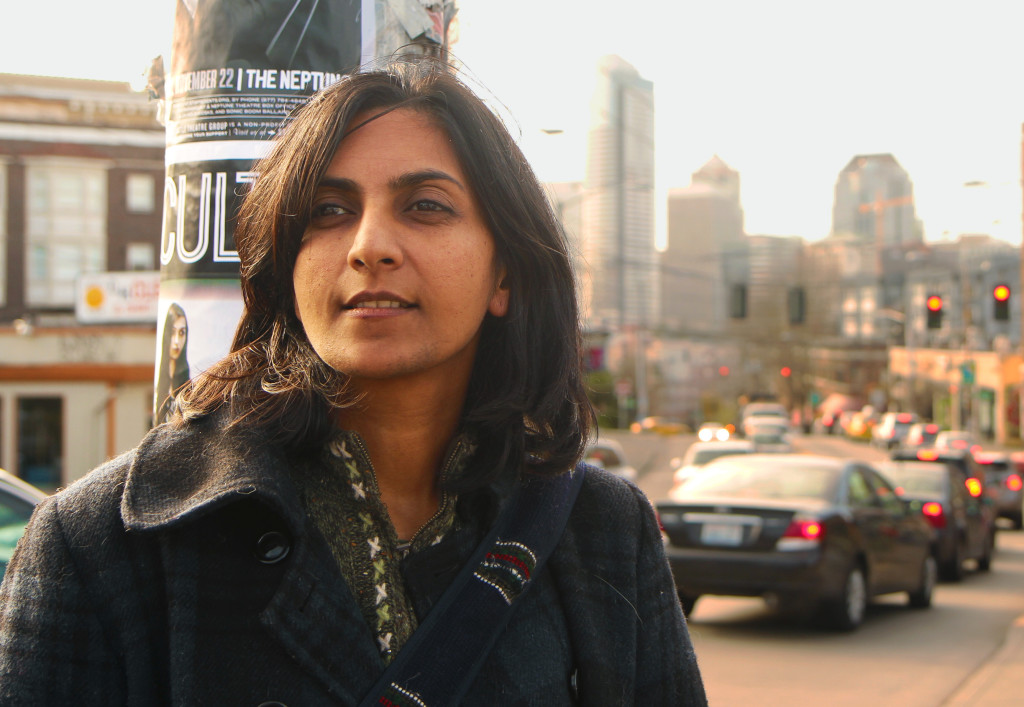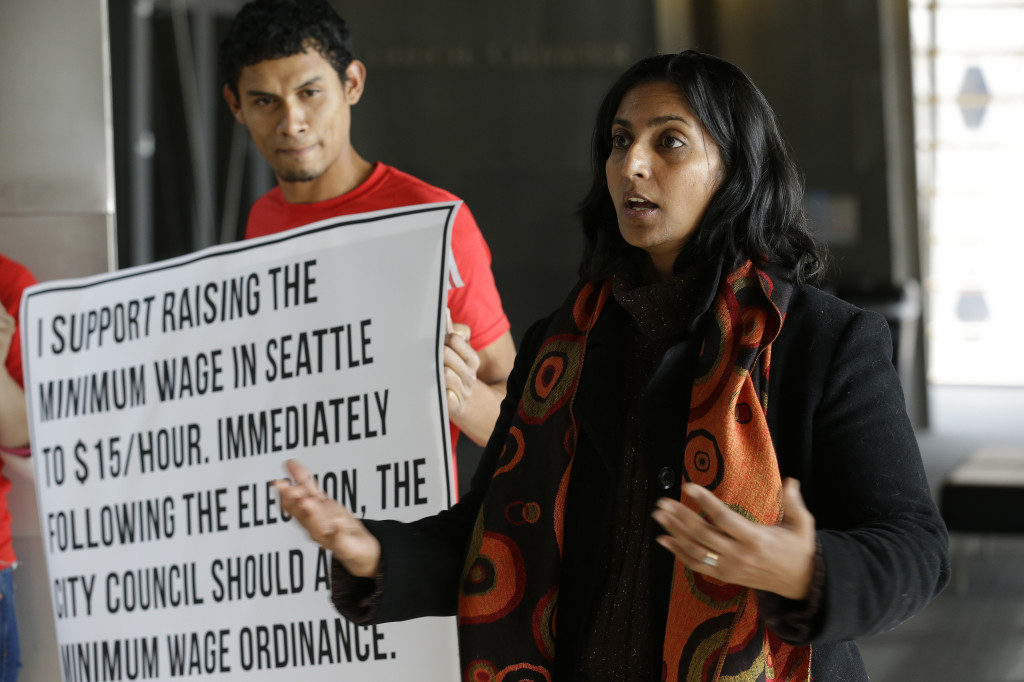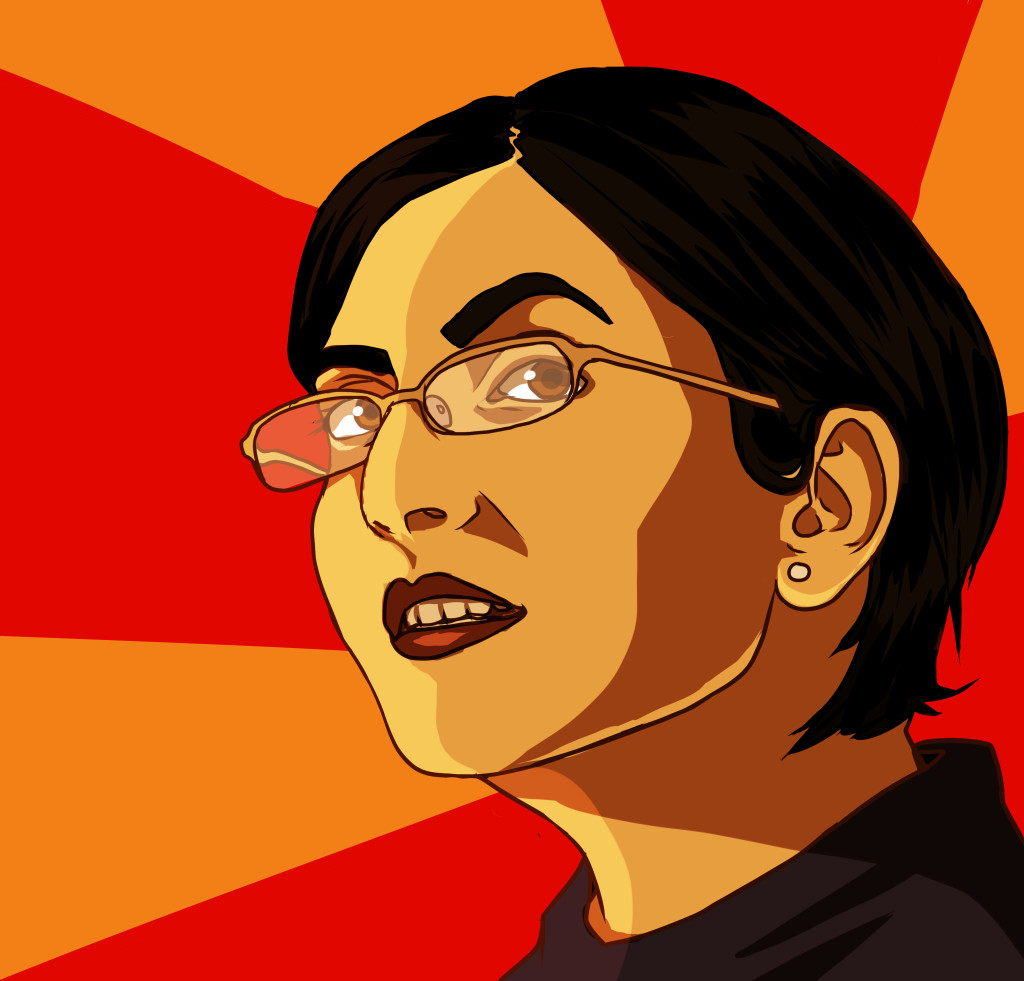A global spotlight is shining down on Seattle in response to the election of self-proclaimed “socialist” Kshama Sawant to City Council in place of democratic council veteran Richard Conlin. Seattle may have earned itself a liberal reputation after years of uninterrupted democratic power, but even in the land of cyclist preeminence and legalized marijuana, a socialist has not been elected to citywide office in nearly a century.
Despite what seems to be popular opinion, socialism has long had a voice in American politics. Eugene Debs was a socialist candidate for President in the 1920s and managed to win over 1 million votes—similarly, one of Vermont’s senators, Bernie Sanders, is an independent socialist.
The political ideology, however, has certainly been put through the ringer in the United States. Senator Joe McCarthy famously conducted a belabored investigation into several political and cultural figures in the country during the Red Scare that followed World War II, and further fear was attached to the term during the Cold War.
Some of Seattle’s more conservative heads are rolling down Broadway at news of Sawants recent victory while others swell at the city’s apparently increasing leftist position. But is all the uproar warranted? The Spectator sat down with newly elected socialist to find out: Who is Kshama Sawant?
The Stranger has openly endorsed Sawant and her progressive perspective, famously calling the election a victory for socialism regardless of its outcome. However, even they’ve backtracked some, admitting to some misconceptions about their candidate being a socialist.
“The truth is, despite her ‘Socialist Alternative’ label and her unapologetically lefty perspective, there is nothing particularly radical when it comes to the core of Sawant’s councilmanic agenda. Sawant was advocating for a $15-an-hour minimum wage a year ago, back before it was cool, before it was widely embraced by mainstream Democrats like U.S. representative Adam Smith,” wrote The Stranger’s David Goldy. “As for the rest of her platform, at the risk of offending her, it is reasonable to say that on transit expansion, on building more affordable housing, on taxing the rich, on blocking coal trains, on expanding paid sick leave, on increasing civilian oversight of the police, and on many other issues, most of Sawant’s policy positions fit comfortably within the mainstream of Seattle’s progressive values.”

Kshama Sawant, a newly elected councilwoman for the city of Seattle, had her position locked in as of Friday Nov. 15, 2013, when her opponent conceded to her victory just two hours before she sat down with The Spectator.
Because of the strong stigma attached to the word, many Americans have been quick to categorize socialists as aggressively militant advocates of a relatively foreign system. The term is frequently used to attack President Obama and Fox News, in writing about Sawant’s election, called the label “politically poisonous.” Sawant, however, has gone out of her way to attach herself to the term during her 2012 run she fought in King County Superior Court for the right to label herself as a member of the Socialist Alternative Party on the ballot and seems to be shifting much of the conversation. She has largely managed to shape an image as a sound-minded, empathetic and, many would say, reasonable policymaker.
However, the question remains: Is Sawant actually a socialist, or just a progressive democrat who’s capitalizing on a sexier brand?
Let’s begin with Sawant’s personal definition of socialism. She states that “socialism is a model for an economy and society that works for human needs and environmental needs.” While many would point to the Scandanavian nations as go-to models of working socialism in the modern age, Sawant vehemently disagrees:
“Sweden, Finland and so-on… are social democracies, meaning they are still governed by the global capitalist system… they are not socialist,” Sawant said.
Sawant certainly does advocate for socialism, but it’s a socialism according to Sawant—with a definition that isn’t entirely clear or specific. Her convictions are deeply rooted in her own experience with oppression. Born in the city of Pune into India’s Brahmin caste, Sawant reports that she loathed the injustice of her divided society. Upon immigrating to the U.S. to further her education, she immediately sought out organizations committed to social justice. As a member of Socialist Alternative, a national organization dedicated to fighting for social, economic and political justice, Sawant earned herself a reputation as an adamant activist. She rallied with angry protestors during the Occupy movement and was even arrested this past summer while protesting the eviction of a working-class person from his home.
Sawant still does express some sentiments that could be viewed as aggressively socialist in an apparent attempt to distance herself from mainstream democrats, but did make a point of discounting many of her goals as infeasible. It remains unclear which version of Sawant is the more authentic.
She identifies several as being the instigators of an oppressive economic environment in Seattle—especially the hedge fund managers, the corporate banks, the real estate conglomerates and—most of all—the “Democratic Party elite.” Sawant stated that Democrats are “not the lesser evil, (but) the more effective evil,” in regards to political oppression both locally and nationally.
She invites Seattleites to question who was responsible for the deployment of pepper spraying police officers on Occupy protestors—pointing out that there is no Republican power to blame, the city is ruled by Democrats. Sawant argued, Seattle’s “Democratic Party elite is in the pockets of the Downtown Seattle Association… political, economic and even social decision-making is heavily skewed towards big business and the super wealthy.”

In this photo taken Nov. 4, 2013, Kshama Sawant speaks outside City Council chambers in Seattle about her support for raising the minimum wage to $15 an hour in the city. Sawant challenged four-term councilman Richard Conlin.
And of course, there is her famous call to collectivize large Seattle corporations like Amazon and Starbucks, but its unclear to many exactly how serious she is when she makes comments in those veins:
The Stranger said, “Sure, if you really push her on the subject, she’ll make a cogent economic argument for, say, collectivizing Amazon, so I guess there’s that. But she’s not running on it, and she freely acknowledges that it’s not going to happen, so it’s not like ‘seizing control of the means of production’ makes Sawant’s list of legislative priorities.”
This image of Sawant as an aggressive advocate seems in keeping with the figure that came forward in 2012 when she campaigned for Washington’s State legislature. Sawant lost this election handily to Frank Chopp, earning only 29 percent of the vote. The Wash. Legislature is a notably more conservative body than Seattle’s City Council and it remains unclear whether Sawant only appeared more radical relative to this more conservative body, or because she’s toned down some in the last year.
Mike McGinn recently lost Seattle’s mayoral election and many attribute his loss directly due to his often combative and idealogical nature—perhaps Sawant realized that Northwesterners don’t necessarily have a taste for overly-aggressive candidates and strategically “mellowed out” for 2013.
The 2013 election was comparatively diplomatic in nature until it neared the end, when the two candidates became increasingly combative in their criticisms of one another. Conlin supporters at Seattle Met magazine wrote a scathing article questioning Sawant’s civic engagement and accusing her play-acting as being a part of the working community while she collected the hefty salary of her Microsoft executive husband.
Sawant responded by calling the story “Conlin’s desperate attempt to smear my campaign” and clarified that she and her husband have been separated for nearly six years and that she did not, in fact, share his income.
On election night, the votes rolling in placed Sawant and Conlin in a see-sawing dead heat. At some points in the night, it appeared as though Sawant had actually lost – some of her live comments at the time reflected, somewhat aggressively, that sentiment.
In a series of brazen tweets (which have since been deleted from her account) Sawant appeared to vent as the votes rolled in. One tweet, directed at Conlin himself, was posted at 12:41 a.m. and read: “@cohenkomo @cmconlin you are the big loser of the night. You can collect your paycheck for 2 years and then…Goodbye. #ConlinisGonelin.”
Eventually, however, her tone shifted as more and more votes came in and she came out on top, the margin between the two widening.
Both Conlin and Sawant supporters waited with bated breath as the 77,173 ballots crept through counting. On election night, Sawant had just 46.1 percent of the votes and many declared her campaign finished. But as counting continued, Sawant eventually developed a modest lead.
By Friday, Sawant was ahead 1,640 votes with 50.3 percent, at which point Conlin conceded his seat in a press conference just two hours before Sawant sat down with The Spectator.
After the final remaining votes had been counted, Sawant ultimately ended up with with 56.3 percent of the vote.
During his concession press conference, Conlin was asked what he would have done differently in the campaign. He answered that there were many things he might have changed, and even goes so far as to imply that he regrets having run a campaign against Sawant at all.









